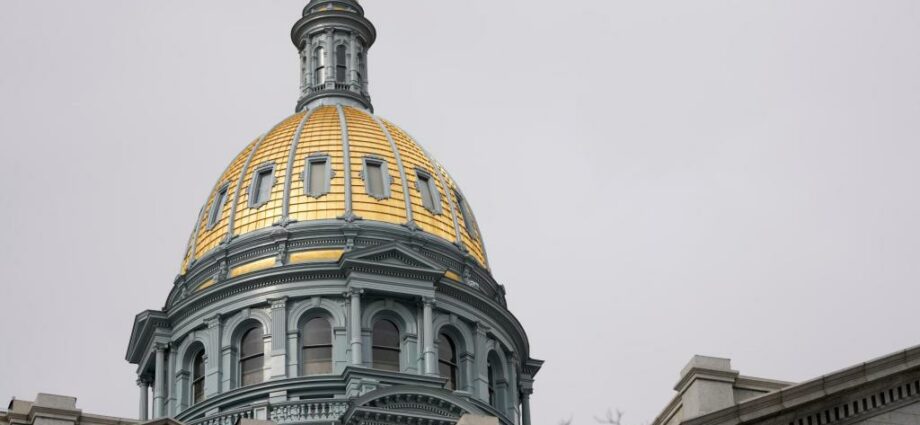Colorado lawmakers have sent their annual budget bill to Gov. Jared Polis, which will dictate state spending for the next fiscal year and ripple out for years to come.
The roughly $38.5 billion spending proposal — which includes a $1.2 billion increase to the general fund — funds the state government’s operations and programs. Lawmakers on the Joint Budget Committee, which drafts the document and ushers it through the General Assembly, characterized their effort largely as a “year of implementation” after a downpour of federal money that helped buoy efforts on things like the environment, education and affordable housing.
“We’re delivering for Colorado families by making record investments in K-12 education, supporting our health care workers, and creating safer communities — all while keeping our state on solid financial footing,” state Sen. Rachel Zenzinger, a Democrat and chair of the committee, said in a statement. “We’ve worked hard to create a balanced, thoughtful budget that funds the infrastructure we need to meet our obligations to our families and communities while helping ensure every Coloradan has what they need to thrive.”
The budget also gives lawmakers an opportunity to highlight certain priorities. From expanded Medicaid coverage to increased per-pupil funding and “very strong” reserves, here are a few tidbits tucked into the package.
A “record” increase to per-pupil funding, more hours for universal preschool
Last year, lawmakers increased per-pupil funding in Colorado schools by about $581 — a record at the time. This year, the budget sent to Polis would give a $900 increase, Zenzinger said.
And that’s before the formal public school financing bill, which could further increase the amount as lawmakers debate how to tackle ongoing education funding issues, she noted. That bill will be debated in the coming weeks of the legislative session.
The proposal also nets parents up to 15 hours of universal preschool in the year before kindergarten — up from the promised 10 hours when lawmakers stood up the program last year. Children and families who meet certain conditions, such as income or special needs, may qualify for up to 25 hours.
The proposal also increases state funding to higher education by $147 million — not as much as the institutions requested, but more than earlier proposals. It also allows the institutions to raise tuition by 5%, Zenzinger said.
Office of School Safety, millions more for crime victims among public safety initiatives
Lawmakers are creating an Office of School Safety and also setting aside millions of dollars for crime victim funds.
The Office of School Safety would oversee a resource center for schools to prepare for and respond to emergencies, as well as house new grant programs.
“It’s about ensuring that our kids are safe and they have every opportunity to grow up and be productive,” Sen. Barbara Kirkmeyer, a Brighton Republican and member of the committee, said.
Lawmakers also added $12 million to the general fund for the Colorado Crime Victim Services Fund and the Community Crime Victims Grant Program.
No more cap on adult dental services, new doula and donor milk services
Lawmakers eliminated a $1,500-per-year cap on adult dental services for Medicaid recipients. That proposal cost about $4.6 million, with a quarter of that coming from money sitting in the unclaimed property trust fund.
It was part of a broader $16.6 million increase in eligibility and benefits provided by programs in the Department of Health Care Policy and Finance. Those broader changes include money for doula services and a donor milk benefit and an increased number of speech therapy sessions before participants need further authorization for the service.
They also added more than $329 million to the fund used to reimburse providers — part of broader efforts by lawmakers to keep the state competitive with the private sector for service providers.
Without that increase, “we cannot get providers because we are not competitive enough,” Zenzinger said.
Budget grows, but lawmakers keep reserves
The budget also preserves a 15% reserve, or about $2.3 billion, to blunt the next economic downturn.
“We have very strong reserves, and we have a bright outlook at this point in the next few years on taxpayers getting refunds,” said Rep. Rod Bockenfeld, a Watkins Republican and committee member. Protecting the Taxpayer’s Bill of Rights, which requires the state to return tax collections above a certain threshold, is among his top priorities.
The state will have to begin to prepare for the end of federal relief money, which Bockenfeld said the budget writers and governor’s office are preparing for.
Bockenfeld did have some criticism of the overall budget, however. In particular, he disagreed with millions more going to the Colorado Option and health care reinsurance program.
Stay up-to-date with Colorado Politics by signing up for our weekly newsletter, The Spot.
Source: Read Full Article
-
Obama’s top economist issues scathing attack on UK mini-budget
-
Blake Masters Caught Lying About Anti-Semitic Backer: Audio
-
The reason Matt Hancock decided to head into the jungle
-
2 in 3 Americans favor term limits for Supreme Court justices, according to poll
-
Sadiq Khan slapped down by campaigners over new ‘vote winner’ eco policy

